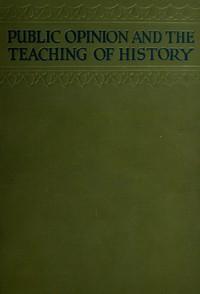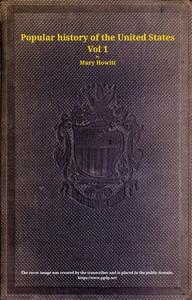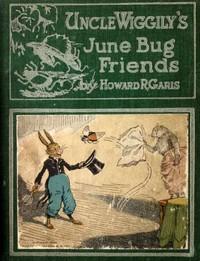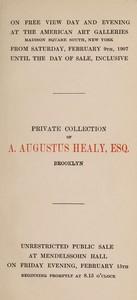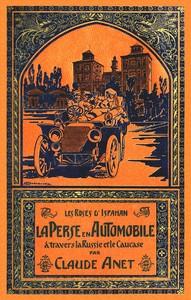|
|
Read this ebook for free! No credit card needed, absolutely nothing to pay.Words: 116008 in 66 pages
This is an ebook sharing website. You can read the uploaded ebooks for free here. No credit cards needed, nothing to pay. If you want to own a digital copy of the ebook, or want to read offline with your favorite ebook-reader, then you can choose to buy and download the ebook.

: Public opinion and the teaching of history in the United States by Pierce Bessie Louise - Thesis (Ph. D.); History Study and teaching United States; Educational law and legislation United States; United States History Study and teaching@FreeBooksThu 08 Jun, 2023 See citations in footnote 52. Maine, Connecticut, Rhode Island, Illinois, Iowa, and Nebraska. Connecticut, Illinois, Montana, Ohio, Oregon being the states which required only history. Oregon's requirement was modern history. Kentucky and Oregon passed laws this year. New Hampshire, Virginia and Louisiana. Dakota Territory, Montana, Idaho, Washington excluded from their schools "partisan" textbooks. LAWS FOR THE EXPANSION OF THE HISTORY CURRICULUM The twentieth century did not usher in unexpected developments in the American educational system, for the school had begun to experience a transformation of purpose in the period following the Civil War. It was not, however, until after 1900 that the forces aroused by the Economic Revolution began to assert themselves to a marked degree and to seek means to equip the individual for the complex responsibilities of his social relationships. The early years of the new century saw a tidal wave of reform sweep into all phases of American life. Agitation for the recall of judicial decisions and the introduction of such measures as the initiative and referendum attested new convictions in the realm of politics. The reform spirit found expression in muck-raking literature, movements for the betterment of dependents on society, legislation to alleviate unfortunate industrial conditions, and schemes of co?peration between employer and employee bore testimony to a new social consciousness and national morality. The public school also gave evidence of the spirit of the new era through the changed character of its instruction. "Preparation for citizenship" became the keynote of the period, perhaps better expressed by John Dewey's definition of education as "The process of remaking experience, giving it a more socialized value through increased individual experience by giving the individual better control over his powers." History and the other social studies gained in popularity as especially adapted to implant the right social attitude. This wider outlook on life did not confine itself solely to an interest in domestic affairs, for the Spanish-American War had banished the long-cherished theory of national isolation. The international viewpoint was encouraged further by the fact that by 1900 the United States had achieved second place as an exporting nation. As a result, the study of foreign history gained in popularity, and increased offerings in the social studies curriculum evinced the growing favor in which these subjects were held. In planning the course of study, educational associations showed much activity in committee reports. The report of the Committee of Seven of the American Historical Association doubtless had a pronounced influence in the curriculum making of the greater part of this period. In 1907, it was followed by the report of the Committee of Five, who made slight changes in the list of studies recommended by the Committee of Seven. However, modern European history received greater emphasis than in the first report, a tangible expression of the expanding horizon of the time. In 1909, the Committee of Eight attempted to standardize a course in history for the elementary schools, in which was included not only United States history but a study of European history. Free books android app tbrJar TBR JAR Read Free books online gutenberg More posts by @FreeBooks
: A popular history of the United States of America Vol. 1 (of 2) by Howitt Mary Mary Botham - United States History@FreeBooksThu 08 Jun, 2023

: Uncle Wiggily's June Bug friends by Garis Howard Roger Campbell Lang Illustrator - Flowers Juvenile fiction; Rabbits Juvenile fiction; Alligators Juvenile fiction; Beetles Juvenile fiction@FreeBooksThu 08 Jun, 2023
|
Terms of Use Stock Market News! © gutenberg.org.in2025 All Rights reserved.

